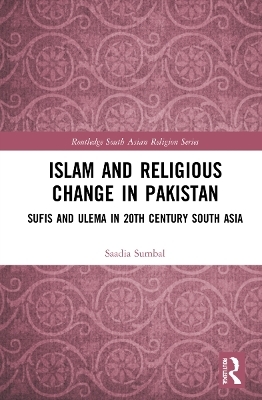
Islam and Religious Change in Pakistan
Sufis and Ulema in 20th Century South Asia
Seiten
2021
Routledge (Verlag)
978-0-367-62242-8 (ISBN)
Routledge (Verlag)
978-0-367-62242-8 (ISBN)
This book examines the history of and the contestations on Islam and the nature of religious change in 20th century Pakistan, focusing in particular on movements of Islamic reform and revival.
This book examines the history of, and the contestations on, Islam and the nature of religious change in 20th century Pakistan, focusing in particular on movements of Islamic reform and revival.
This book is the first to bring the different facets of Islam, particularly Islamic reformism and shrine-oriented traditions, together within the confines of a single study ranging from the colonial to post-colonial era. Using a rich corpus of Urdu and Arabic material including biographical accounts, Sufi discourses (malfuzat), letter collections, polemics and unexplored archival sources, the author investigates how Islamic reformism and shrine-oriented religiosity interacted with one another in the post-colonial state of Pakistan. Focusing on the district of Mianwali in Pakistani northwestern Punjab, the book demonstrates how reformist ideas could only effectively find space to permeate after accommodating Sufi thoughts and practices; the text-based religious identity coalesced with overlapped traditional religious rituals and practices. The book proceeds to show how reformist Islam became the principal determinant of Islamic identity in the post-colonial state of Pakistan and how one of its defining effects was the hardening of religious boundaries.
Challenging the approach of viewing the contestation between reformist and shrine-oriented Islam through the lens of binaries modern/traditional and moderate/extremist, this book makes an important contribution to the field of South Asian religion and Islam in modern South Asia.
This book examines the history of, and the contestations on, Islam and the nature of religious change in 20th century Pakistan, focusing in particular on movements of Islamic reform and revival.
This book is the first to bring the different facets of Islam, particularly Islamic reformism and shrine-oriented traditions, together within the confines of a single study ranging from the colonial to post-colonial era. Using a rich corpus of Urdu and Arabic material including biographical accounts, Sufi discourses (malfuzat), letter collections, polemics and unexplored archival sources, the author investigates how Islamic reformism and shrine-oriented religiosity interacted with one another in the post-colonial state of Pakistan. Focusing on the district of Mianwali in Pakistani northwestern Punjab, the book demonstrates how reformist ideas could only effectively find space to permeate after accommodating Sufi thoughts and practices; the text-based religious identity coalesced with overlapped traditional religious rituals and practices. The book proceeds to show how reformist Islam became the principal determinant of Islamic identity in the post-colonial state of Pakistan and how one of its defining effects was the hardening of religious boundaries.
Challenging the approach of viewing the contestation between reformist and shrine-oriented Islam through the lens of binaries modern/traditional and moderate/extremist, this book makes an important contribution to the field of South Asian religion and Islam in modern South Asia.
Saadia Sumbal is Assistant Professor in the Department of History at Forman Christian College University, Pakistan.
Introduction
1. Migrant Sufis and ‘rooting’ of Islam (ca. 1600–1900)
2. Reformist Islam and Sufism: A dialectical religious identity
3. Reformist Islam and Majlis-i-Ahrar's Politics of Nationalism
4. Sectarianism and the politics of religious exclusion
5. Deobandi identity and sectarian cleavage
Conclusion
| Erscheinungsdatum | 30.07.2021 |
|---|---|
| Reihe/Serie | Routledge South Asian Religion Series |
| Zusatzinfo | 2 Tables, black and white; 4 Halftones, black and white; 4 Illustrations, black and white |
| Verlagsort | London |
| Sprache | englisch |
| Maße | 156 x 234 mm |
| Gewicht | 453 g |
| Themenwelt | Geisteswissenschaften ► Religion / Theologie ► Islam |
| ISBN-10 | 0-367-62242-4 / 0367622424 |
| ISBN-13 | 978-0-367-62242-8 / 9780367622428 |
| Zustand | Neuware |
| Haben Sie eine Frage zum Produkt? |
Mehr entdecken
aus dem Bereich
aus dem Bereich


